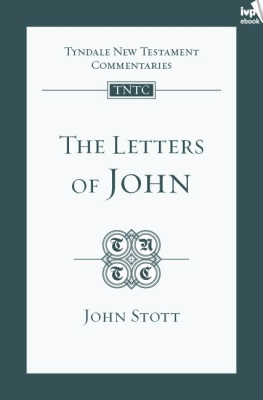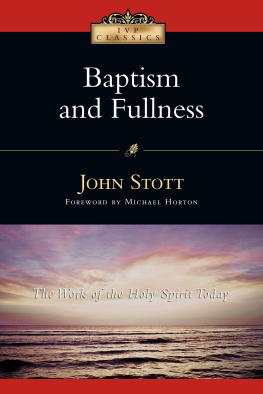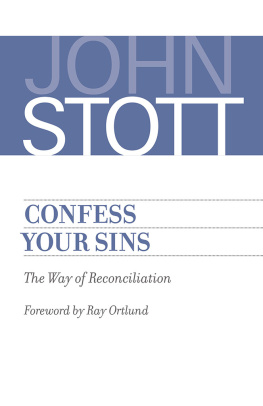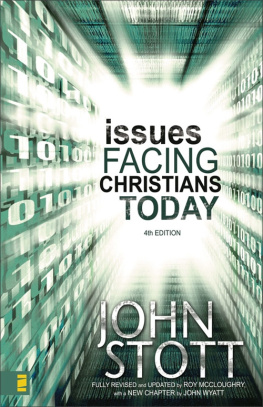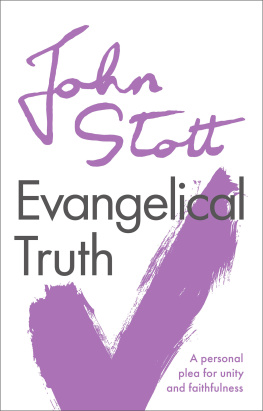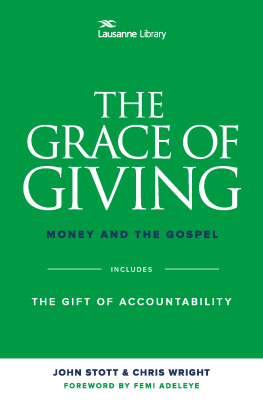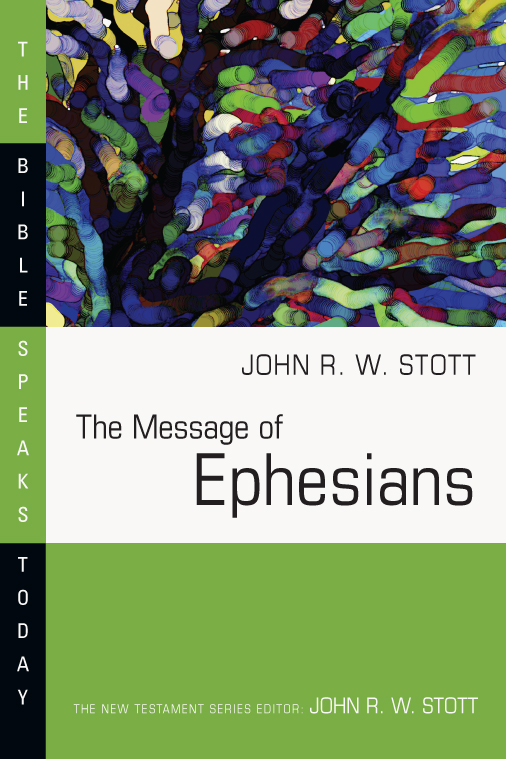General preface
THE BIBLE SPEAKS TODAY describes three series of expositions, based on the books of the Old and New Testaments, and on Bible themes that run through the whole of Scripture. Each series is characterized by a threefold ideal:
- to expound the biblical text with accuracy
- to relate it to contemporary life, and
- to be readable.
These books are, therefore, not commentaries, for the commentary seeks rather to elucidate the text than to apply it, and tends to be a work rather of reference than of literature. Nor, on the other hand, do they contain the kinds of sermons that attempt to be contemporary and readable without taking Scripture seriously enough. The contributors to The Bible Speaks Today series are all united in their convictions that God still speaks through what he has spoken, and that nothing is more necessary for the life, health and growth of Christians than that they should hear what the Spirit is saying to them through his ancientyet ever modernWord.
ALEC MOTYER
JOHN STOTT
DEREK TIDBALL
Series editors
Authors preface
Those of us who call ourselves evangelical Christians are claiming by this epithet to be gospel people, who hold fast the authentic Christian evangel. It is a bold claim, and sometimes resented. In order to sustain it, we need constantly to return to the Scriptures in which alone the normative statement of the gospel is to be found. Measured by this standard, it has to be admitted that many of our formulations of the good news are defective. One of our chief evangelical blind spots has been to overlook the central importance of the church. We tend to proclaim individual salvation without moving on to the saved community. We emphasize that Christ died for us to redeem us from all iniquity rather than to purify for himself a people of his own. We think of ourselves more as Christians than as churchmen, and our message is more good news of a new life than of a new society.
Nobody can emerge from a careful reading of Pauls letter to the Ephesians with a privatized gospel. For Ephesians is the gospel of the church. It sets forth Gods eternal purpose to create through Jesus Christ a new society which stands out in bright relief against the sombre background of the old world. For Gods new society is characterized by life in place of death, by unity and reconciliation in place of division and alienation, by the wholesome standards of righteousness in place of the corruption of wickedness, by love and peace in place of hatred and strife, and by unremitting conflict with evil in place of a flabby compromise with it.
This vision of a renewed human community has stirred me deeply. At the same time, the realities of lovelessness and sin in so many contemporary churches are enough to make one weep, for they dishonour Christ, contradict the nature of the church, and deprive the Christian witness of integrity. Yet increasing numbers of church members are seeking the churchs radical renewal. For the sake of the glory of God and the evangelization of the world, nothing is more important than that the church should be, and should be seen to be, Gods new society. Towards the fulfilment of this vision Ephesians gives us a strong and steady stimulus.
During the past five years and more I have been studying the text of Ephesians, absorbing its message, feeling its impact and dreaming its dream. It has been a great practical help in this period to attempt to expound the letter to various groups and to receive their reactions. I began with the responsive and long-suffering congregation of All Souls Church, and continued with conferences in India, Nepal, Canada and Mexico, and in July 1975 with the memorable Keswick Centenary Convention. No audience is more alert and critical than one composed of students; I have therefore found it specially profitable to share with student groups in India, America, Europe, Australia and Latin America, and to be challenged by the more sustained exposition required in 1976 by the Summer Study Institute at the University of Maryland, USA, and by the Summer School of Regent College, Vancouver. I am extremely grateful for the intellectual and spiritual stimulation of these experiences.
I am also grateful to several individuals who have given me personal help in various ways in the writing of this book, especially to Roy McCloughry for tracking down some useful references, to Myra Chave-Jones for reading a portion of the MS and to Tom Cooper for reading it all, and for their comments, and to Frances Whitehead and Vivienne Curry for the strenuous labour of deciphering my scribble and converting it into beautiful typescript.
JOHN R. W. STOTT
Chief abbreviations
AG | A Greek-English Lexicon of the New Testament and Other Early Christian Literature by William F. Arndt and F. Wilbur Gingrich (University of Chicago Press and Cambridge University Press, 1957). |
Armitage Robinson | St Pauls Epistle to the Ephesians, with Exposition and Notes by J. Armitage Robinson (Macmillan, 1903). |
AV | The Authorized (King James) Version of the Bible, 1611. |
Barclay | The Letters to the Galatians and Ephesians in the Daily Study Bible by William Barclay (The Saint Andrew Press, 1954. 2nd edition, 1958). |
Barth, Broken Wall | The Broken Wall: A Study of the Epistle to the Ephesians by Markus Barth (1959. Collins, 1960). |
Barth, Ephesians I, II | Ephesians, A New Translation with Introduction and Commentary by Markus Barth, in the Anchor Bible (Doubleday, 1974. Vol. I, Eph. 13; Vol. II, Eph. 46). |
Bruce | The Epistle to the Ephesians, A Verse-by-verse Exposition by F. F. Bruce (Pickering & Inglis, 1961). |
Caird | Pauls Letters from Prison by G. B. Caird, in the New Clarendon Bible (Oxford, 1976). |
Calvin | Sermons on the Epistle to the Ephesians by John Calvin (delivered 15589, first published in English in 1577, revised translation by Banner of Truth, 1973). |
Dale | Lectures on the Epistle to the Ephesians, its Doctrine and Ethics by R. W. Dale (Hodder & Stoughton, 1882; 5th edition 1890). |
Findlay | The Epistle to the Ephesians by G. G. Findlay, in the Expositors Bible (Hodder & Stoughton, 1892). |
Foulkes | The Epistle of Paul to the Ephesians by Francis Foulkes, in the Tyndale New Testament Commentaries (Inter-Varsity Press, 1963). |
GNB | The Good News Bible (Todays English Version), NT 1966, 4th edition 1976; OT 1976 (The Bible Societies and Collins). |
Gurnall | The Christian in Complete Armour, or a Treatise of the Saints War against the Devil by William Gurnall (originally published in 3 sections, 1655, 1658 and 1661: 3 volumes, 8th edition, London, 1821). |
Hendriksen | Exposition of Ephesians by William Hendriksen (Baker, 1967). |
Hodge | A Commentary on the Epistle to the Ephesians by Charles Hodge (1856. Banner of Truth, 1964). |
Houlden | Pauls Letters from Prison by J. H. Houlden, in the Pelican New Testament Commentary |


